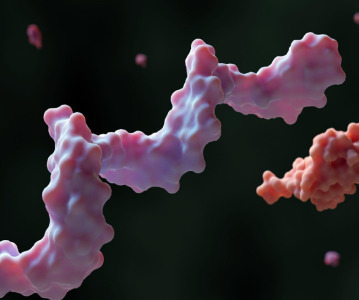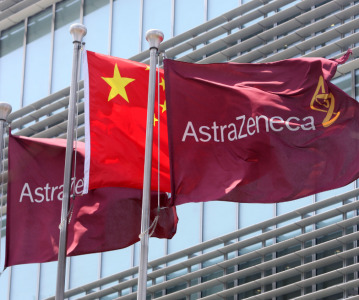Regeneron and Sanofi Announce Positive Results from Phase 2b Study of Dupilumab in Patients with Moderate-to-Severe Asthma

Regeneron Pharmaceuticals and Sanofi have announced positive results from the interim analysis of a dose-ranging Phase IIb study of dupilumab in adult patients with uncontrolled moderate-to-severe asthma. Dupilumab is an investigational therapy blocking IL-4 and IL-13, two cytokines required for the Th2 immune response.
"Many have thought that targeting the Th2 pathway in asthma would limit benefit to a subset of asthmatics, such as those with high eosinophils. In this study, blocking IL-4/IL-13 signaling with dupilumab improved lung function and reduced severe exacerbations in the broader study population," said Elias Zerhouni, MD, President, Global R&D, Sanofi. "Based on these results, we plan to move dupilumab into Phase 3 clinical development in patients with moderate-to-severe uncontrolled asthma."
In the study, the three highest doses of dupilumab in combination with standard-of-care therapy met the primary endpoint of a statistically significant improvement from baseline in forced expiratory volume over one second (FEV1, a standard measure of lung function) at Week 12 in patients with high blood eosinophils (greater than or equal to 300 cells/microliter), as compared to placebo in combination with standard-of-care therapy. In addition, two doses of dupilumab (200 mg every other week and 300 mg every other week) showed a statistically significant improvement in mean percent change in FEV1, as well as a reduction in severe exacerbations, in both the high eosinophils and overall study population.
Key results included
• In the high eosinophils patient group: Mean improvements from baseline in FEV1 (and mean percent change in FEV1) at 12 weeks, the primary (and a secondary) endpoint of the study were: 390 mL (26%) dupilumab 300 mg every other week (Q2W); 430 mL (26%) dupilumab 200 mg Q2W; 180 mL (10%) placebo. (p less than 0.01)
• In the overall population: Mean improvements from baseline in FEV1 at 12 weeks (and mean percent change in FEV1) were: 280 mL (18%) dupilumab 300 mg Q2W; 310 mL (18%) dupilumab 200 mg Q2W; 120 mL (6%) placebo. (p less than 0.001)
• In both the high eosinophils patient group and overall patient group: Dupilumab showed a reduction in adjusted annualized rate of severe exacerbations compared to placebo (64–75% reduction, p less than 0.05 for high eosinophils group and p less than 0.01 for the overall population).
• These results were based on a pre-specified interim analysis, which occurred when all patients had reached Week 12 of the 24-week treatment period; the average treatment duration at the time of the analysis was 21.5 weeks. The final analyses on exacerbations and safety will occur at 24 weeks.
The most common adverse event was injection site reaction, which was more frequent in the four dupilumab dose groups (13–25%) compared to placebo (12%). Other common adverse events in the study included upper respiratory tract infection (10–13% dupilumab; 13% placebo), headache (5–10% dupilumab; 8% placebo), nasopharyngitis (3–10% dupilumab; 6% placebo) and bronchitis (5–8% dupilumab; 8% placebo). The incidence of infections was balanced across treatment groups (42–45% dupilumab; 46% placebo), as was the incidence of serious adverse events (3–7% dupilumab; 5% placebo).
"Patients with moderate-to-severe asthma have a high unmet medical need, often struggling with daily symptoms and recurring asthma attacks, despite the use of inhaled steroids, long-acting beta agonists and rescue medications," said George D. Yancopoulos, MD, PhD, Chief Scientific Officer of Regeneron and President of Regeneron Laboratories. "This trial is encouraging given the positive results observed on the most clinically meaningful endpoints — FEV1, a key measure of lung function, and asthma exacerbations — were seen on top of ongoing background therapy. We look forward to continued investigation in further studies."
Related News
-
News Google-backed start-up raises US$600 million to support AI drug discovery and design
London-based Isomorphic Labs, an AI-driven drug design and development start-up backed by Google’s AI research lab DeepMind, has raised US$600 million in its first external funding round by Thrive Capital. The funding will provide further power t... -
News AstraZeneca to invest US$2.5 billion in Beijing R&D centre
Amid investigations of former AstraZeneca China head Leon Wang in 2024, AstraZeneca have outlined plans to establish its sixth global strategic R&D centre in China. Their aim is to further advance life sciences in China with major research and manufact... -
News Experimental drug for managing aortic valve stenosis shows promise
The new small molecule drug ataciguat is garnering attention for its potential to manage aortic valve stenosis, which may prevent the need for surgery and significantly improve patient experience. -
News How GLP-1 agonists are reshaping drug delivery innovations
GLP-1 agonist drug products like Ozempic, Wegovy, and Mounjaro have taken the healthcare industry by storm in recent years. Originally conceived as treatment for Type 2 diabetes, the weight-loss effects of these products have taken on unprecedented int... -
News A Day in the Life of a Start-Up Founder and CEO
At CPHI we work to support Start-Up companies in the pharmaceutical industry and recognise the expertise and innovative angles they bring to the field. Through our Start-Up Programme we have gotten to know some of these leaders, and in this Day in the ... -
News Biopharmaceutical manufacturing boost part of new UK government budget
In their national budget announced by the UK Labour Party, biopharmaceutical production and manufacturing are set to receive a significant boost in capital grants through the Life Sciences Innovative Manufacturing Fund (LSIMF). -
News CPHI Podcast Series: The power of proteins in antibody drug development
In the latest episode of the CPHI Podcast Series, Lucy Chard is joined by Thomas Cornell from Abzena to discuss protein engineering for drug design and development. -
News Amgen sues Samsung biologics unit over biosimilar for bone disease
Samsung Bioepis, the biologics unit of Samsung, has been issued a lawsuit brought forth by Amgen over proposed biosimilars of Amgen’s bone drugs Prolia and Xgeva.
Recently Visited
Position your company at the heart of the global Pharma industry with a CPHI Online membership
-
Your products and solutions visible to thousands of visitors within the largest Pharma marketplace
-
Generate high-quality, engaged leads for your business, all year round
-
Promote your business as the industry’s thought-leader by hosting your reports, brochures and videos within your profile
-
Your company’s profile boosted at all participating CPHI events
-
An easy-to-use platform with a detailed dashboard showing your leads and performance







.png)